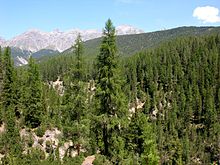Pollutant sink
A pollutant sink is a technical or natural system that removes pollutants from the environment. It is therefore the opposite of a pollutant source.
Natural sinks
Natural sinks are e.g. B. Forests, oceans and polar regions, which - under appropriate climatic conditions - absorb large amounts of the greenhouse gas carbon dioxide and thus reduce the proportion of this pollutant in the atmosphere ( carbon sinks ). The carbon dioxide is either stored (ocean) or chemically converted (forests).
Artificial sinks
Artificial pollutant sinks are, for example, waste incineration plants (MVA). If the combustion residues ( electrostatic precipitator ash and slag ) are properly disposed of , they serve as effective pollutant sinks for, among other things, mercury in waste. The amount of dioxins and other organic substances is reduced by incineration in modern waste incineration plants.
literature
- Johann Feichter: The atmosphere as a pollutant sink - Influence on material cycles and climate , in: Industrial Ecology: Successful ways to sustainable industrial systems , pp. 41–58, doi : 10.1007 / 978-3-8351-9225-6_4
- Hubert Vogg: From the pollutant source to the pollutant sink - new concepts of waste incineration , in: Chemie Ingenieur Technik , 60 (4), pp. 247–255, doi : 10.1002 / cite.330600404
- U. Förstner, W. Calmano, W. Ahlf: Sediments as pollutant sinks and sources: memory, protection good, time bomb, repository , in: FH Frimmel (Ed.): Wasser und Gewässer , Spektrum Akademischer Verlag, Heidelberg 1999, ISBN 3827401771
Individual evidence
- ↑ Leo S. Morf, Paul H. Brunner: MVA as a pollutant sink, material flow analysis for mercury in the MHKW Würzburg , 2005.

